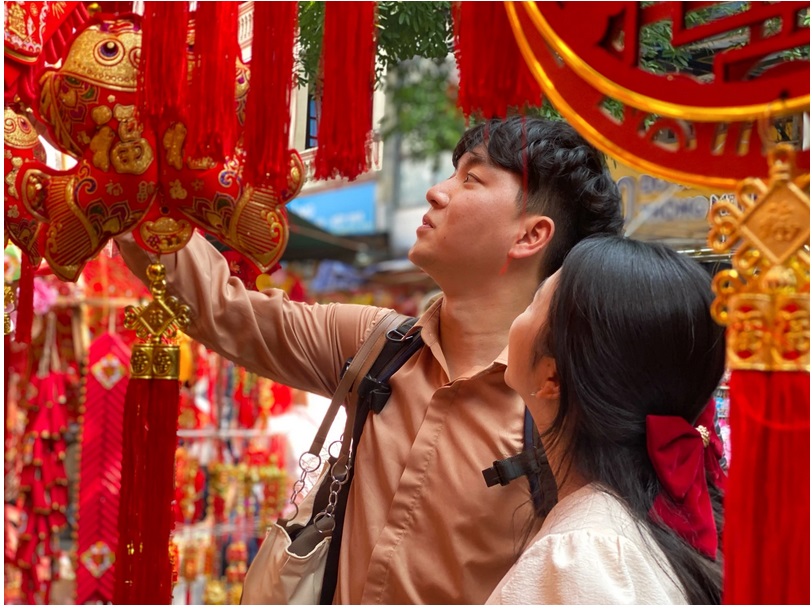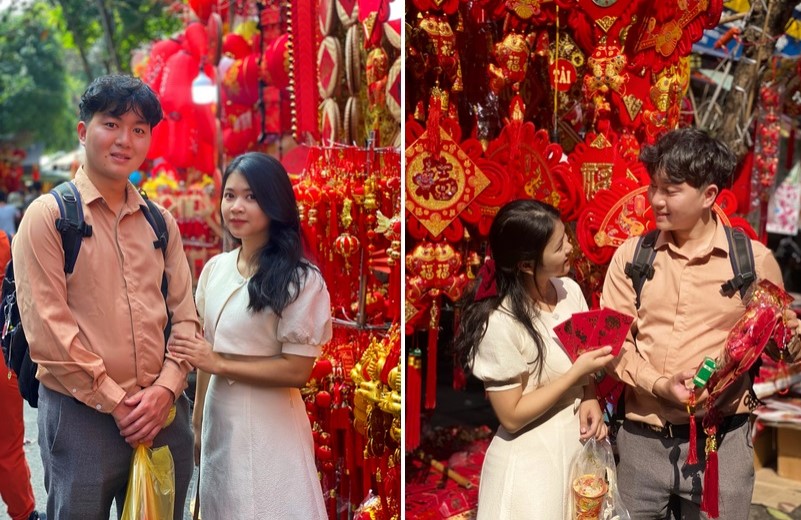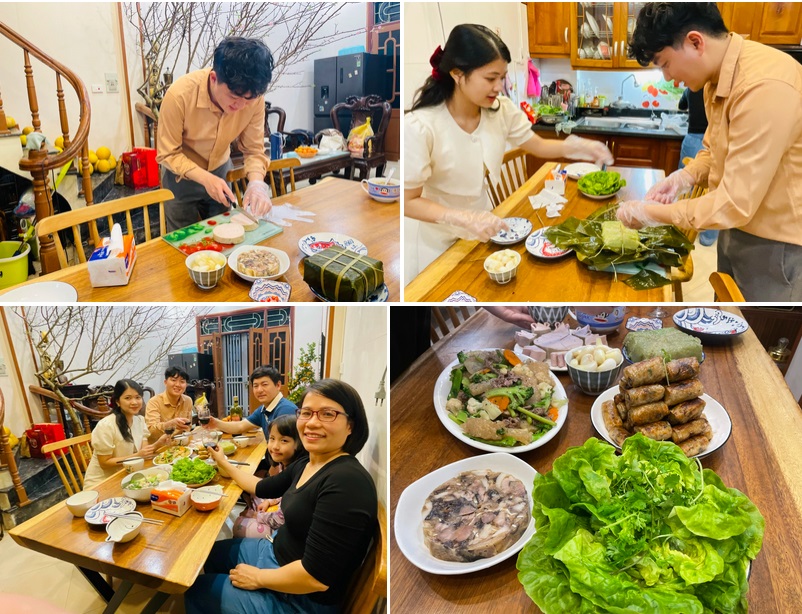Okabe Chikara is currently studying at the University of Social Sciences and Humanities, Vietnam National University, Hanoi. Photo: Ngoc Bich.
On the afternoon of the 25th of the twelfth lunar month, after the Tet holiday, Okabe Chikara (28 years old) finally had time to go to Hang Ma Street to admire the streets of Hanoi in the days leading up to the Lunar New Year of the Year of the Dragon 2024.
"Perhaps I'm the 'master' of Vietnamese Tet because this is the 7th year I've celebrated the Vietnamese Lunar New Year," Okabe shared with Tri Thuc - Znews.
He is a Japanese international student currently studying in the Department of Vietnamese Studies and Vietnamese Language (Faculty of Social Sciences and Humanities, Vietnam National University, Hanoi).
Vietnamese New Year also shares many similarities with Japanese New Year.In 2015, while studying at university in Japan, Okabe had the opportunity to interact with Vietnamese international students through a part-time job. He recounted that the young Vietnamese people were very kind and cheerful. They often talked about their homeland and cooked Vietnamese food for Okabe to enjoy.
"Since then, I've become interested in Vietnam and its people. In 2017, I had the opportunity to visit the country. Unexpectedly, it turned out to be a major turning point as I 'fell in love' with it. I decided to defer my studies in Japan and then enrolled at the Hanoi University of Humanities in 2020," Okabe shared.
In Vietnam, Okabe has a very impressive name - Nguyen Khoe Manh (Nguyen Healthy). He explains that his Japanese name is "力 - Chikara," which translates to "Strength" in Vietnamese. Wanting to create a sense of closeness and familiarity, he chose the name Khoe Manh (Healthy).
For seven years in Vietnam, Khoẻ Mạnh has celebrated Lunar New Year here. He mentioned that Japan no longer celebrates the traditional Lunar New Year; instead, they celebrate the Gregorian New Year. However, the Japanese and Vietnamese New Year share some similarities, with people in both countries having extended holidays and spending most of their time with family.
Like the Vietnamese, the Japanese also clean their houses to welcome the new year, visit temples and shrines at the beginning of the year to pray for good fortune. People will visit each other's homes to reminisce about the past year and wish each other a happy new year.
Japan has a custom of giving red envelopes (lucky money), but Khoẻ Mạnh says that the Japanese only give them to children. In Vietnam, he was quite surprised to see that parents and grandparents also receive lucky money from young people. Friends also exchange red envelopes for good luck in the new year.
"Similar to the Vietnamese, the Japanese also avoid doing anything inauspicious during the first three days of the new year. But the difference is that many Japanese people - including me - don't spend money on the first day, so the practice of giving lucky money is done from the second day onwards," Mạnh explained.
In Japan, people don't prepare elaborate New Year's feasts like in Vietnam. Instead, they prepare a traditional Osechi ryori meal, served in jubako boxes – a type of lacquered box designed like a bento box, containing a variety of colorful and visually appealing foods. Each dish has a symbolic meaning, a wish for blessings in the new year.
Manh remembers that the first time he celebrated Vietnamese Tet, he was "shocked" to see Vietnamese people buying carp on the day of the Kitchen God and Stove God, but then releasing the fish after the ceremony. He used to think this was a waste of money.
It wasn't until he went to university, directly learned about Vietnam's traditional culture, and received explanations from friends, that Mạnh understood that these were the customs and beliefs of the Vietnamese people.
"It turns out that on the 23rd day of the 12th lunar month, the Kitchen Gods ride carp to heaven to report to the celestial court," Khoẻ Mạnh said excitedly.
Seven years in Vietnam means seven years of celebrating Lunar New Year here. Photo: Ngoc Bich.
Go to Hang Ma Street to learn New Year greetings.This year, after the Lunar New Year holiday, Khoẻ Mạnh and his girlfriend went to Hàng Mã to admire the streets and buy New Year decorations. This is the second year he's done this because he enjoys the crowds and the bustling atmosphere of Hanoi's Old Quarter shopping in the days leading up to Tet.
Having lived in Vietnam for six years, riding a motorbike is nothing new to Mạnh. Blending into the crowds on the street, Mạnh feels just as excited as he would be celebrating Tet back home. Looking at the peach blossoms, kumquats, and the red and yellow colors of the decorations, Mạnh feels the Tet atmosphere drawing very near.
Walking along Hang Ma Street, he stopped at several shops, browsing and comparing prices. Manh said that even though it was his second year here during Tet, he was still shocked by the high prices of items in the Old Quarter compared to the limited budget of a student studying abroad. However, having "Vietnamese-ized" the culture, he wasn't afraid to ask for prices and haggle before making a purchase.
Manh said that on the second day of Tet this year, he plans to visit his girlfriend's family (whom he's known for 3 years) in Phu Tho. Therefore, these days he's been learning many New Year's greetings to confidently introduce himself to them.
"I'm quite worried because, unlike Japan, Vietnamese people have many New Year's greetings for a wide variety of people. For example, children are wished good health and rapid growth, pregnant women are wished a safe delivery, and elderly people are wished a long life. I heard that my girlfriend's family has many relatives, so I have to review the greetings now," Mạnh shared, adding that if he has time, he will visit Hung Temple on New Year's Day.
Khoẻ Mạnh and his girlfriend went shopping for Tet decorations in Hang Ma. Photo: Ngoc Bich.
"
"Mastering" Vietnamese Tet, but it was my first time cutting banh chung (traditional Vietnamese rice cake) with bamboo strips.Although he loves Tet (Vietnamese New Year), because he lives alone, Khoẻ Mạnh has never personally prepared a Tet feast. During the first few days of the year, he usually just sleeps, watches movies, and calls his family.
The streets of Hanoi are very quiet these days because everyone has gone back to their hometowns to celebrate Tet, just like Tokyo. Manh quite likes this; he considers it a time to rest after a year of studying and working.
Several years ago, he was invited to dinner at the homes of friends and acquaintances on this occasion. Manh was very impressed and enjoyed the traditional Vietnamese dishes, including banh chung (sticky rice cake).
“Previously, my Japanese language students gave me a lot of sticky rice cakes (bánh chưng). I really liked them and ate them continuously for many days. They were delicious. But then, I got tired of them and even disliked them. It wasn't until my students showed me different ways to eat them, like frying them or eating them with condiments like chili sauce, that I started to love this type of cake again,” Mạnh shared.
This Tet holiday, Mạnh said he was very happy to be invited to visit the home of Professor Bùi Văn Tuấn, a lecturer in the Department of Vietnamese Studies and Vietnamese Language, University of Social Sciences and Humanities, Vietnam National University, Hanoi. He also considered this an opportunity to express his gratitude to his dear teacher for his dedicated support throughout his studies in Vietnam.
On the afternoon of the 25th of the twelfth lunar month, after going to Hang Ma Street, Manh and his girlfriend went to his teacher's house early. He was excited because he would get to prepare and enjoy some dishes from the traditional Vietnamese New Year's feast.
“In previous years, I only went to acquaintances' houses and ate meals. This year, I got to experience firsthand cutting and arranging pork sausage into flower shapes, and most importantly, I learned how to cut sticky rice cakes using string. I was taught to reuse banana leaves, arrange the string on the cake, turn it upside down on a plate, and pull the string up to cut it,” Mạnh said.
He said that in previous years, he only knew how to cut banh chung (Vietnamese rice cake) with a knife, which was very sticky and difficult to wash off. The student was surprised to learn that Vietnamese people have such a creative way of cutting banh chung.
Khoẻ Mạnh was delighted to personally prepare and enjoy some dishes from the Vietnamese Tet (Lunar New Year) feast at the home of teacher Bùi Văn Tuấn. Photo: Provided by the interviewee.
Manh was also very happy when the teacher's family explained the meaning of the dishes in the traditional meal. The teacher also showed him how to choose beautiful peach and kumquat trees, and how to combine dishes to enhance the flavor, such as pork sausage served with pickled onions, and spring rolls served with herbs…
For the first time experiencing knowledge beyond textbooks, Mạnh found it much more fascinating and interesting. He said that in the future, when he starts a family in Vietnam, he will imitate and apply these tips during Tet (Vietnamese New Year).
But despite the joy, Mạnh also felt very homesick. Especially when he witnessed his teacher's family gathering together to prepare a family meal.
"On occasions like these, I often feel a pang of sadness and miss my parents," Mạnh said.
Over the past six years, due to health reasons, Mạnh has only returned to Japan twice. This year, he hopes to bring his parents to Vietnam to attend his graduation ceremony, and he will also arrange to visit his family in Japan.



